邹定斌博士外汇交易与管理双语教学外汇指定银行办理结汇
邹定斌博士给《投资学》出考查试卷(本科)

一.单项选择题(20题每题3分=60分)1.为在满足明确的风险承受能力和适用的限制条件下,实现既定的回报率要求的策略是A 投资限制B 投资目标C 投资政策D 上述各项均正确E 上述各项均不正确2.一个经常被引用来解释完全融资养老基金投资于普通股票的原因的错误说法是A 股票有较高的风险B 债券有较低的回报C 股票提供了防范通货膨胀的手段D 股票有较高的回报E 所有上述说法均是被经常引用的错误认识3、风险容忍水平对而言非常高的是A 银行B 财产保险公司C 人寿保险公司D A和BE A和C4、一种对投资者在资产投资方面的限制是A 投资限制B 投资目标C 投资政策D 上述各项均正确E 上述各项均不正确5. 假如要成立一个专项奖学金,每年奖励10000元,年利率为5%,则现在需要____运作资金A. 100万元B. 10万元C. 20万元D. 50万元E. 上述各项均不准确6.一年以前,你在自己的储蓄账户中存入1000美元,收益率为7%,如果年通胀率为3%,你的近似实际收益率为____A. 4%B. 10%C. 7%D. 3%E. 上述各项均不准确7. 公司的优先股经常以低于其债券的收益率出售,这是因为_______A. 优先股通常有更高的代理等级B. 优先股持有人对公司的收入有优先要求权C. 优先股持有人在公司清算时对公司的资产有优先要求权D. 拥有股票的公司可以将其所得红利收入免征所得税8. 下面各个选项中,不是货币市场工具的特征的是 ___________A. 流动性B. 可销售性C. 长期限D. 股金变现E. C和D9、假定用100 000美元投资,与右下表的无风险短期国库券相比,投资于股票A. 13 000 美元B. 15 000美元C. 18 000 美元D. 20 000美元10、资本配置线由直线变成曲线,是什么原因造成的?A. 风险回报率上升B. 借款利率高于贷款利率C. 投资者风险承受力下降D. 无风险资产的比例上升11、假设证券市场处于CAPM模型所描述的均衡状态。
银行外汇业务政策培训
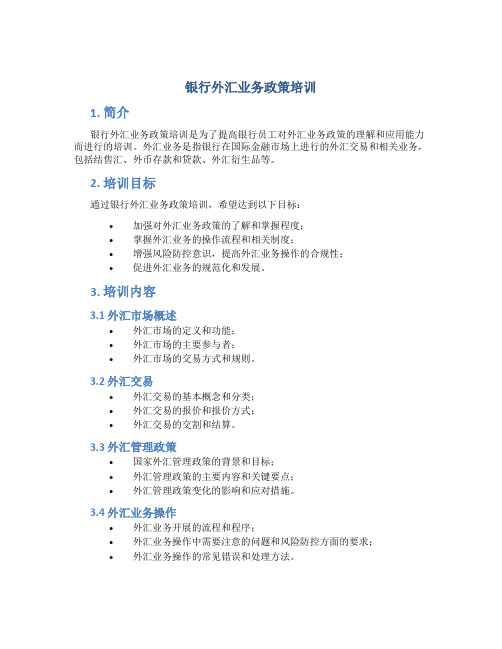
银行外汇业务政策培训1. 简介银行外汇业务政策培训是为了提高银行员工对外汇业务政策的理解和应用能力而进行的培训。
外汇业务是指银行在国际金融市场上进行的外汇交易和相关业务,包括结售汇、外币存款和贷款、外汇衍生品等。
2. 培训目标通过银行外汇业务政策培训,希望达到以下目标:•加强对外汇业务政策的了解和掌握程度;•掌握外汇业务的操作流程和相关制度;•增强风险防控意识,提高外汇业务操作的合规性;•促进外汇业务的规范化和发展。
3. 培训内容3.1 外汇市场概述•外汇市场的定义和功能;•外汇市场的主要参与者;•外汇市场的交易方式和规则。
3.2 外汇交易•外汇交易的基本概念和分类;•外汇交易的报价和报价方式;•外汇交易的交割和结算。
3.3 外汇管理政策•国家外汇管理政策的背景和目标;•外汇管理政策的主要内容和关键要点;•外汇管理政策变化的影响和应对措施。
3.4 外汇业务操作•外汇业务开展的流程和程序;•外汇业务操作中需要注意的问题和风险防控方面的要求;•外汇业务操作的常见错误和处理方法。
3.5 外汇衍生品交易•外汇衍生品的定义和类型;•外汇衍生品交易的基本流程和操作方法;•外汇衍生品交易的风险管理和监管要求。
4. 培训方式4.1 理论学习通过课堂教学和讲解,向学员介绍外汇业务政策和相关知识,提供基本理论背景。
4.2 实际操作安排实际操作环节,让学员亲身参与外汇业务的操作流程,加深对外汇业务的理解和应用能力。
4.3 案例分析通过案例分析,引导学员运用所学知识解决实际问题,提高实际应用能力。
5. 培训评估为了确保培训效果,进行培训评估是必要的。
培训评估内容可以包括:•学员对培训内容的掌握程度;•学员在实际操作中的表现和应用能力;•培训对学员工作的影响和贡献。
6. 培训效果跟踪培训结束后,可以进行培训效果跟踪,了解培训对学员的实际工作和业绩的影响,以及对银行外汇业务的改进和提升。
结束语银行外汇业务政策培训对于提高银行员工的业务能力和风险防控水平具有重要意义。
外汇交易2024年培训材料

,在上升趋势中,当价格回调至趋势线附近并获得支撑时,可能形成买
入机会。
指标分析工具
移动平均线
移动平均线是一种常用的技术指标,通过计算一定周期内价格的平均值并绘制成线,用于 平滑价格波动并显示趋势方向。
相对强弱指数(RSI)
RSI是一种振荡器指标,用于衡量市场价格的超买超卖情况。当RSI超过70时,市场可能 超买并面临回调风险;当RSI低于30时,市场可能超卖并存在反弹机会。
04
风险管理与资金安全
XX
风险识别与评估方法
基本面分析
关注全球经济形势、政策变化、 地缘政治等宏观因素,评估它们
对汇率的影响。
技术分析
运用图表、指标等工具分析市场 趋势,识别潜在的风险和机会。
风险评估模型
采用定量分析方法,如VAR(风 险价值)模型,对历史数据进行
回测,评估风险大小。
止损和止盈设置技巧
固定止损
设定一个固定的止损点,当亏损达到该点时自动 平仓,限制最大亏损。
动态止损
根据市场波动调整止损点,确保止损设置与当前 市场情况相符。
止盈目标设定
设定合理的盈利目标,当达到目标时及时止盈, 锁定利润。
仓位管理和资金配置策略
仓位控制
合理分配每个交易品种的仓位,避免过度集中或分散投资。
资金管理计划
严格执行计划
遵守自己制定的交易计 划,不随意更改或违背
原则。
记录和总结
定期记录交易过程和结 果,总结经验教训,不 断完善自己的交易策略
和方法。
持续学习和进步
保持对市场和技术的关 注和学习态度,不断提 升自己的交易能力和水
平。
06
平台使用指南及操作技巧
XX
2024年度《外汇培训教材》PPT课件

个人投资者
个人投资者通过参与外汇交易来实现资产保 值增值的目的。
D
2024/3/23
6
外汇交易时间
亚洲时段
欧洲时段
东京市场是亚洲时段的主要交易中心,交 易时间为北京时间早8点至下午3点。
伦敦市场是欧洲时段的主要交易中心,交 易时间为北京时间下午3点至晚上12点。
美洲时段
交叉时段
纽约市场是美洲时段的主要交易中心,交 易时间为北京时间晚上8点至次日凌晨5点 。
金的流入和流出。
跨境融资方式
02
包括国际商业贷款、国际金融机构贷款、政府贷款等,涉及外
汇资金的借贷和还本付息。
跨境投资与融资风险管理
03
关注汇率波动、利率变化、政治风险等因素对跨境投资与融资
的影响,采取相应措施进行风险管理。
17
04 外汇风险管理方法
2024/3/23
18
企业外汇风险管理
2024/3/23
建立外汇风险管理机制
包括风险识别、评估、监控和报告等环节。
使用金融衍生工具
如远期合约、期权等,对冲外汇风险。
合理安排资金结构
通过调整债务和权益的比例,降低汇率波动对企业财务的影响。
19
银行外汇风险管理
2024/3/23
实行外汇头寸管理
通过对外汇头寸进行实时监控和调整,降低汇率风险。
提供外汇风险管理服务
浮动汇率制度
一国政府不规定本国货币与外国货币的官方汇率,听任汇率随外汇市场供求变化自由浮动 。该制度具有灵活性、市场决定性和自动调节国际收支等优点,但可能导致汇率波动剧烈 和不确定性增加。
管理浮动汇率制度
一国政府通过外汇市场干预、资本流动管理等措施来影响汇率走势,使汇率在一定范围内 浮动。该制度结合了固定汇率制度和浮动汇率制度的优点,但管理难度较大且可能引发市 场扭曲。
邹定斌博士双语教学《外汇交易与管理》模拟B卷答案

邹定斌博士双语教学《外汇交易与管理》模拟B卷答案第一篇:邹定斌博士双语教学《外汇交易与管理》模拟B卷答案邹定斌博士《外汇交易与管理》双语教学模拟考试(B卷答案)一、名词解释1、间接套汇:又叫三角套汇,是指套汇人利用三个或三个以上外汇市场上同一时间的汇率差异,同时在三地市场上贱买贵卖,从中赚取汇差的行为。
2、逐日盯市制:即根据当日交易情况,逐日将收益亏损记入保证金帐户的做法。
旨在确保杜绝交易违约现象。
即每日计算客户持仓合约的浮动盈亏。
3、Hedging(先译为中文后解释):套期保值是指把期货市场当作转移价格风险的场所,利用期货合约作为将来在现货市场上买卖商品的临时替代物,对其现在买进准备以后售出商品或对将来需要买进商品的价格进行保险的交易活动。
二、单选题1—5 CCCAB 6—10 ACADA三、多选题1-ABCDE 2-ABCD 3-ABC 4-BC 5-ABCDE四、判断题1-5 ×√√×√五、简答题1、答:套汇交易包括时间套汇和地点套汇。
时间套汇是指套汇者利用不同交割期限所造成的汇率差异,在买入或卖出即期外汇的同时,卖出或买入远期外汇;或者在买入或卖出远期外汇的同时,卖出或买入期限不同的远期外汇,借此获取时间收益,以获得盈利的套汇方式。
它常被称为防止汇率风险的保值手段。
地点套汇是指套汇者利用不同外汇市场之间的汇率差异,同时在不同的地点进行外汇买卖,低买高卖,以赚取汇率差额的一种套汇方式。
套汇者就利用这个短暂的外汇差异,在汇率较低的市场上买进一种货币,然后在汇率较高的市场上卖出该种货币,从中获取差价利益,套汇就由此产生了。
这种套汇交易的结果,会造成汇率低的货币求大于供,原本较贱的货币汇率上涨;而汇率高的货币供大于求,原本较贵的货币汇率下跌,从而使不同外汇市场的汇率差异很快趋于消失,套汇不再有利。
2、答:(1)买卖双方的权利、义务是不对等的;(2)期权交易的收益与风险具有明显的非对称性;(3)外汇期权购买者的权利具有很强的时间性。
外汇业务基础知识培训(58张)

外汇业务基础知识培训(58张)一、教学内容本节课的教学内容来自于教材的第五章第一节,主要内容包括外汇的定义、外汇市场的构成、外汇交易的基本方式以及外汇汇率的形成机制。
二、教学目标1. 让学生了解外汇的定义和特点,理解外汇市场的构成和运作机制。
2. 让学生掌握外汇交易的基本方式,包括现汇交易、现钞交易和远期交易。
3. 让学生了解外汇汇率的形成机制,理解买入价、卖出价、中间价和现汇买入价、现钞买入价、现汇卖出价、现钞卖出价之间的关系。
三、教学难点与重点重点:外汇的定义、外汇市场的构成、外汇交易的基本方式以及外汇汇率的形成机制。
难点:外汇汇率的形成机制,以及买入价、卖出价、中间价和现汇买入价、现钞买入价、现汇卖出价、现钞卖出价之间的关系。
四、教具与学具准备教具:多媒体教学设备学具:教材、笔记本、笔五、教学过程1. 情景引入:通过一个实际的外汇交易案例,让学生了解外汇交易的实际应用场景。
2. 教材讲解:详细讲解外汇的定义、外汇市场的构成、外汇交易的基本方式以及外汇汇率的形成机制。
3. 例题讲解:通过具体的例题,让学生理解买入价、卖出价、中间价和现汇买入价、现钞买入价、现汇卖出价、现钞卖出价之间的关系。
4. 随堂练习:让学生通过教材后的练习题,巩固所学的内容。
5. 板书设计:将买入价、卖出价、中间价和现汇买入价、现钞买入价、现汇卖出价、现钞卖出价之间的关系用板书形式呈现出来。
6. 作业设计:题目1:请简述外汇的定义和特点。
答案1:外汇是指不同国家货币之间的兑换关系,它具有普遍接受性、可兑换性、波动性和风险性等特点。
题目2:请解释外汇市场的构成和运作机制。
答案2:外汇市场由各种参与主体构成,包括商业银行、非银行金融机构、企业和个体投资者等。
外汇市场的运作机制主要包括供求关系、汇率形成机制和交易机制。
题目3:请解释外汇交易的基本方式。
答案3:外汇交易的基本方式包括现汇交易、现钞交易和远期交易。
现汇交易是指通过银行或其他金融机构进行的货币兑换交易;现钞交易是指通过银行或其他金融机构进行的货币兑换并交付现金的交易;远期交易是指买卖双方在成交后一定期限内进行货币兑换的交易。
银行外汇业务政策培训
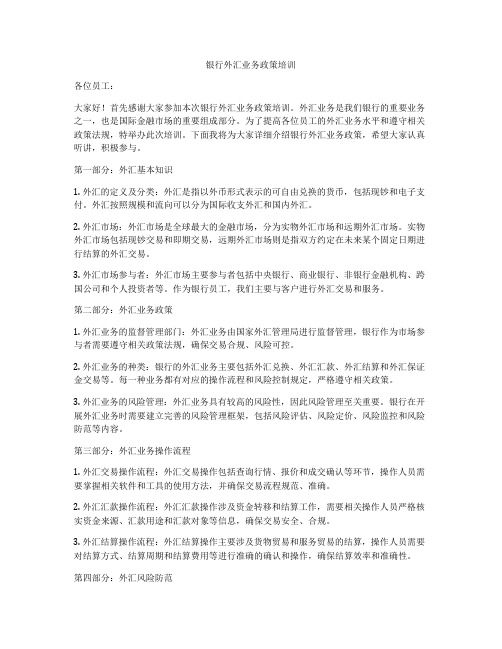
银行外汇业务政策培训各位员工:大家好!首先感谢大家参加本次银行外汇业务政策培训。
外汇业务是我们银行的重要业务之一,也是国际金融市场的重要组成部分。
为了提高各位员工的外汇业务水平和遵守相关政策法规,特举办此次培训。
下面我将为大家详细介绍银行外汇业务政策,希望大家认真听讲,积极参与。
第一部分:外汇基本知识1. 外汇的定义及分类:外汇是指以外币形式表示的可自由兑换的货币,包括现钞和电子支付。
外汇按照规模和流向可以分为国际收支外汇和国内外汇。
2. 外汇市场:外汇市场是全球最大的金融市场,分为实物外汇市场和远期外汇市场。
实物外汇市场包括现钞交易和即期交易,远期外汇市场则是指双方约定在未来某个固定日期进行结算的外汇交易。
3. 外汇市场参与者:外汇市场主要参与者包括中央银行、商业银行、非银行金融机构、跨国公司和个人投资者等。
作为银行员工,我们主要与客户进行外汇交易和服务。
第二部分:外汇业务政策1. 外汇业务的监督管理部门:外汇业务由国家外汇管理局进行监督管理,银行作为市场参与者需要遵守相关政策法规,确保交易合规、风险可控。
2. 外汇业务的种类:银行的外汇业务主要包括外汇兑换、外汇汇款、外汇结算和外汇保证金交易等。
每一种业务都有对应的操作流程和风险控制规定,严格遵守相关政策。
3. 外汇业务的风险管理:外汇业务具有较高的风险性,因此风险管理至关重要。
银行在开展外汇业务时需要建立完善的风险管理框架,包括风险评估、风险定价、风险监控和风险防范等内容。
第三部分:外汇业务操作流程1. 外汇交易操作流程:外汇交易操作包括查询行情、报价和成交确认等环节,操作人员需要掌握相关软件和工具的使用方法,并确保交易流程规范、准确。
2. 外汇汇款操作流程:外汇汇款操作涉及资金转移和结算工作,需要相关操作人员严格核实资金来源、汇款用途和汇款对象等信息,确保交易安全、合规。
3. 外汇结算操作流程:外汇结算操作主要涉及货物贸易和服务贸易的结算,操作人员需要对结算方式、结算周期和结算费用等进行准确的确认和操作,确保结算效率和准确性。
外汇市场自律机制系列培训教材

第一章 总体要求
三、业务审核
11.关于电子数据核查。
B类企业出口项下外币现钞收入无需进待核查账户,外币现钞结汇时,银行应当实施电子数据核查。 B类企业在贸易退汇同时发生货物退运的,银行应当在办理相应贸易退汇的付汇或待核查账户结汇或划出 手续时,实施电子数据核查;B类企业的无货物退运退汇和错汇款退汇,银行应凭外汇局出具的《登记表》 办理,无需实施电子数据核查;B类企业超期限或无法原路退汇业务,银行应凭外汇局出具的《登记表》办 理,并根据《登记表》“外汇局登记情况”栏注明情况,确定是否需要实施电子数据核查。
(4)陆运单。对于可疑交易,应与陆运单出具方联系,核验单据真实性。审核单据的各项要素信息,确认客 户对货物的所有权,应注意陆运单不是货权凭证,不可转让。
(5)空运单。对于可疑交易,应与空运单出具方联系,核验单据真实性。审核单据的各项要素信息,确认客 户对货物的所有权,应注意空运单不是货权凭证,不可转让。
2. 银行在为企业办理外汇资金入账前,应确定收汇资金性质,无法确定的要及时与企业联系,要求
企业说明。若企业不在名录内,银行应暂时将该笔外汇资金挂账,并适时通知企业到外汇局办理名录登 记。
3. 银行为企业办理待核查账户资金结汇或划出手续前,应查询企业名录状态与分类状态,并按规
定对交易单证的真实性及其与贸易外汇收支的一致性进行合理审查。
审核途径包括海关电子口岸系统、监测系统、仓储公司、国际提单查询机构、船公司、行业协会等网站及 实地查访、海外联行或母行、本行其他分支机构、其他从事相同或类似交易的本行其他客户等。
1.客户
(1)货物贸易外汇收支主体应与进出口报关单收发货人一致; (2)企业应当按照“谁出口谁收汇、谁进口谁付汇”原则办理贸易外汇收支业务,捐赠项下进出口业务 等外汇局另有规定的情况除外。代理进口、出口业务应当由代理方付汇、收汇。代理进口业务项下,委托 方可凭委托代理协议将外汇划转给代理方,也可由代理方购汇,委托方不得购汇。代理出口业务项下,代 理方收汇后可凭委托代理协议将外汇划转给委托方,也可结汇将人民币划转给委托方。
外汇交易培训 (2)

外汇交易培训
外汇交易培训是指通过专业的培训课程来学习和掌握外汇
交易的知识和技巧。
通过接受外汇交易培训,个人和机构
可以学习到外汇市场的基本概念、交易原理、分析方法以
及风险管理等内容,从而提高自己的交易能力和盈利水平。
外汇交易培训通常包括以下内容:
1. 外汇市场基础知识:介绍外汇市场的基本概念和交易机制,包括货币对、报价方式、交易时间等。
2. 技术分析:介绍使用图表和指标等技术工具进行外汇市
场分析的方法,包括趋势分析、支撑阻力位等。
3. 基本面分析:介绍通过分析国际经济动态、国际政治事
件等基本面因素来预测外汇市场走势的方法。
4. 风险管理:介绍如何设定止损位、控制风险以及资金管
理等方面的内容,以确保交易风险在可控范围内。
5. 实践操作:通过模拟交易和实盘交易等方式进行实践操作,提供实际交易经验的培训。
外汇交易培训可以通过线上或线下的方式进行,可以选择参加专业机构的培训课程,也可以通过自学和在线学习平台获取相关知识。
在选择培训机构时,可以考虑其教学质量、师资力量、教学资源等方面的因素。
此外,实践操作和持续学习也是提高交易能力的重要途径。
邹定斌博士指导的本科毕业生学士学位论文新拟的题目
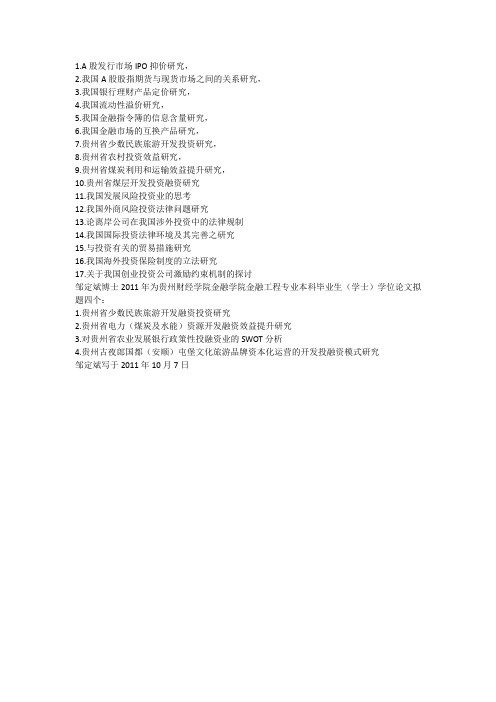
1.A股发行市场IPO抑价研究,
2.我国A股股指期货与现货市场之间的关系研究,
3.我国银行理财产品定价研究,
4.我国流动性溢价研究,
5.我国金融指令簿的信息含量研究,
6.我国金融市场的互换产品研究,
7.贵州省少数民族旅游开发投资研究,
8.贵州省农村投资效益研究,
9.贵州省煤炭利用和运输效益提升研究,
10.贵州省煤层开发投资融资研究
11.我国发展风险投资业的思考
12.我国外商风险投资法律问题研究
13.论离岸公司在我国涉外投资中的法律规制
14.我国国际投资法律环境及其完善之研究
15.与投资有关的贸易措施研究
16.我国海外投资保险制度的立法研究
17.关于我国创业投资公司激励约束机制的探讨
邹定斌博士2011年为贵州财经学院金融学院金融工程专业本科毕业生(学士)学位论文拟题四个:
1.贵州省少数民族旅游开发融资投资研究
2.贵州省电力(煤炭及水能)资源开发融资效益提升研究
3.对贵州省农业发展银行政策性投融资业的SWOT分析
4.贵州古夜郎国都(安顺)屯堡文化旅游品牌资本化运营的开发投融资模式研究
邹定斌写于2011年10月7日。
《国际结算》理论教学大纲(供四年制本科商务英语专业使用)
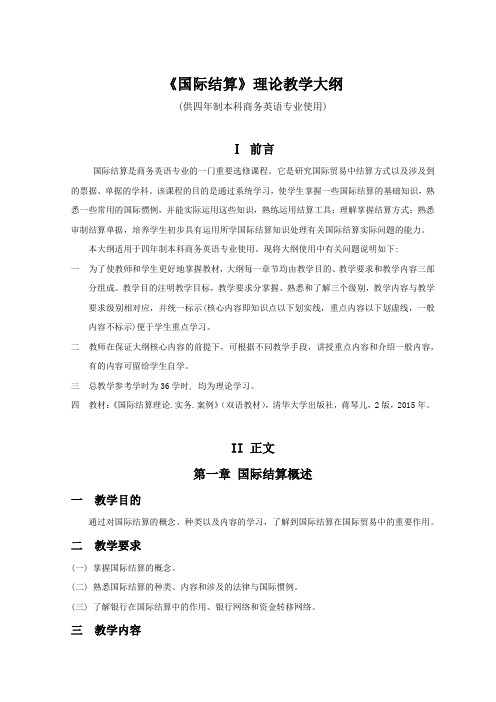
《国际结算》理论教学大纲(供四年制本科商务英语专业使用)Ⅰ前言国际结算是商务英语专业的一门重要选修课程。
它是研究国际贸易中结算方式以及涉及到的票据、单据的学科。
该课程的目的是通过系统学习,使学生掌握一些国际结算的基础知识,熟悉一些常用的国际惯例,并能实际运用这些知识,熟练运用结算工具;理解掌握结算方式;熟悉审制结算单据,培养学生初步具有运用所学国际结算知识处理有关国际结算实际问题的能力。
本大纲适用于四年制本科商务英语专业使用。
现将大纲使用中有关问题说明如下:一为了使教师和学生更好地掌握教材,大纲每一章节均由教学目的、教学要求和教学内容三部分组成。
教学目的注明教学目标,教学要求分掌握、熟悉和了解三个级别,教学内容与教学要求级别相对应,并统一标示(核心内容即知识点以下划实线,重点内容以下划虚线,一般内容不标示)便于学生重点学习。
二教师在保证大纲核心内容的前提下,可根据不同教学手段,讲授重点内容和介绍一般内容,有的内容可留给学生自学。
三总教学参考学时为36学时, 均为理论学习。
四教材:《国际结算理论.实务.案例》(双语教材),清华大学出版社,蒋琴儿,2版,2015年。
II 正文第一章国际结算概述一教学目的通过对国际结算的概念、种类以及内容的学习,了解到国际结算在国际贸易中的重要作用。
二教学要求(一) 掌握国际结算的概念。
(二) 熟悉国际结算的种类、内容和涉及的法律与国际惯例。
(三) 了解银行在国际结算中的作用、银行网络和资金转移网络。
三教学内容(一) 国际结算的概念、基本种类与内容。
1 国际结算的概念。
2 国际结算的基本种类。
3 国际结算的基本内容。
(二)国际结算的历史演变及涉及的国际惯例。
(三)国际结算体系及银行网络。
第二章国际结算票据一教学目的通过对国际结算票据的学习,了解票据的作用及使用。
二教学要求(一) 掌握票据的性质、功能以及汇票、本票和支票的具体使用。
(二) 熟悉汇票的必要事项及其具体记载,汇票当事人的责任和义务,汇票的行为及其具体表示。
试论如何改善对外汇指定银行的外汇管理

试论如何改善对外汇指定银行的外汇管理
吴宗仁;陈晓瑜
【期刊名称】《江苏金融》
【年(卷),期】1999(000)011
【摘要】外汇管理对外汇指定银行的依存度很大,有相当部门的外汇监管意图例
如结售汇管理、外汇帐户管理、国际收支问接申报等,要通过外汇指定银行来实施。
本文拟对加强和改善外汇指定银行的外汇管理工作作一些探讨。
【总页数】1页(P27-27)
【作者】吴宗仁;陈晓瑜
【作者单位】国家外汇管理局泰州市支局
【正文语种】中文
【中图分类】F832.63
【相关文献】
1.规范收汇结汇业务防范金融外汇风险--访国家外汇管理局外汇指定银行收结汇检查办公室负责人 [J],
2.国家外汇管理局关于外汇指定银行办理中国电子口岸顶级部门IC卡有关问题的
通知(2003年8月15日国家外汇管理局发布) [J], 无
3.国家外汇管理局关于对外汇指定银行收汇、结汇业务进行专项检查的通知(2003年8月12日国家外汇管理局发布) [J], 无
4.国家外汇管理局关于外汇指定银行停止报送挂牌汇价日报表的通知 [J],
5.国家外汇管理局关于外汇指定银行对客户人民币外汇货币掉期业务有关外汇管理问题的通知 [J],
因版权原因,仅展示原文概要,查看原文内容请购买。
如何看待对银行结售汇业务实行专项监管
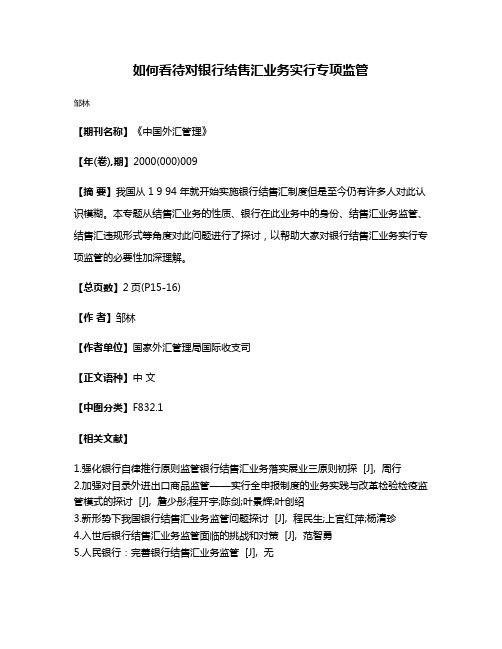
如何看待对银行结售汇业务实行专项监管
邹林
【期刊名称】《中国外汇管理》
【年(卷),期】2000(000)009
【摘要】我国从1 9 94 年就开始实施银行结售汇制度但是至今仍有许多人对此认识模糊。
本专题从结售汇业务的性质、银行在此业务中的身份、结售汇业务监管、结售汇违规形式等角度对此问题进行了探讨,以帮助大家对银行结售汇业务实行专项监管的必要性加深理解。
【总页数】2页(P15-16)
【作者】邹林
【作者单位】国家外汇管理局国际收支司
【正文语种】中文
【中图分类】F832.1
【相关文献】
1.强化银行自律推行原则监管银行结售汇业务落实展业三原则初探 [J], 周行
2.加强对目录外进出口商品监管——实行全申报制度的业务实践与改革检验检疫监管模式的探讨 [J], 詹少彤;程开宇;陈剑;叶景辉;叶创绍
3.新形势下我国银行结售汇业务监管问题探讨 [J], 程民生;上官红萍;杨清珍
4.入世后银行结售汇业务监管面临的挑战和对策 [J], 范智勇
5.人民银行:完善银行结售汇业务监管 [J], 无
因版权原因,仅展示原文概要,查看原文内容请购买。
云南省德宏州本外币兑换特许机构经常项目缅币兑换试点业务管理办法

云南省德宏州本外币兑换特许机构经常项目缅币兑换试点业务管理办法文章属性•【制定机关】国家外汇管理局云南省分局•【公布日期】2014.10.27•【字号】•【施行日期】2014.10.27•【效力等级】地方规范性文件•【时效性】失效•【主题分类】外汇管理正文云南省德宏州本外币兑换特许机构经常项目缅币兑换试点业务管理办法目录第一章总则第二章特许机构管理要求第三章兑换主体管理要求第四章监督管理第五章附则第一章总则第一条根据《中华人民共和国外汇管理条例》、《个人本外币兑换特许业务试点管理办法》、贸易、服务贸易、边境贸易等相关外汇管理法规,特制定本办法。
第二条本办法所称个人本外币兑换特许机构(以下简称特许机构)是指经外汇管理部门批准在试点地区开展经常项下缅币兑换业务的特许机构。
第三条本办法所称经常项下缅币兑换试点业务是指经批准的特许机构在试点地区经常项目经济活动中所涉及的人民币与缅币之间的兑换业务。
第四条本办法所称“经常项目”包括货物贸易、服务贸易、收益和经常转移。
第五条本办法所指的参与经常项下缅币兑换试点业务的主体包括个人、个体工商户、境内企业。
(一)本办法所称个人包括境内个人和境外个人。
1.境内个人是指持有中华人民共和国居民身份证、军人身份证件、武警警察身份证件的中国公民。
2.境外个人是指从德宏傣族景颇族自治州(以下简称德宏州)口岸地区出入境的持有护照的缅甸公民或持有边境边民出入境通行证的缅甸边民。
(二)本办法所称个体工商户是指经德宏州工商行政管理部门登记,领取个体工商户营业执照,依法开展经营活动的公民。
(三)本办法所称境内企业包括注册地在德宏州,从事生产经营活动的经济组织。
第二章特许机构管理要求第六条特许机构经营经常项下缅币兑换试点业务,实行自主经营、自负盈亏、缅币头寸自我平衡的原则,遵循真实、合法的交易基础,并按照了解你的客户、了解你的业务、尽职审查的原则办理。
第七条特许机构经营经常项下缅币兑换试点业务应建立客户风险评估认证和风险等级管理机制,并建立关注兑换主体台账管理制度和大额交易单证审核制度,有效防控风险。
《国际金融》(邹卒)805-6

《国际金融》课后题答案第一章一、单项选择题1.A 2.B 3.A 4.A二、多项选择题1.AB 2.CD 3.AB 4.ABD 5.AD三、判断题1.×2.√3.√4.√5.√四、简答题1.答:目前,IMF根据不同账户提供和获得经济资源的性质,将国际收支平衡表分为经常账户、资本和金融账户、净误差与遗漏账户三大部分。
经常账户显示了居民与非居民之间的货物和服务、初次收入和二次收入的流量。
这些项目是一国国际收支中最基础、最常见的项目,因此被称为经常项目。
经常账户包括货物和服务账户、初次收入账户、二次收入账户。
资本和金融账户主要反映资本在居民与非居民之间的转移,包括资本账户、金融账户。
净误差与遗漏账户又称“错误和遗漏项目”,是人为设置的一个账户。
该账户是基于会计上的需要,在国际收支平衡表中借方与贷方出现差额时,用以抵消由于资料不完整、统计时间和计价标准不同、不同币种之间存在换算差额等原因而形成的统计偏差。
2.答:(1)国际收支逆差的影响持续、大规模的国际收支逆差不利于一国的对外经济交往。
外汇供应不足将导致本币贬值,本币的国际地位降低,甚至可能引发短期资本外流。
如果一国长期处于国际收支逆差状态,不仅会严重消耗该国的储备资产,影响其金融实力,还会使该国的偿债能力降低,削弱其在国际上的信誉。
(2)国际收支顺差的影响持续、大规模的国际收支顺差也会给一国经济带来不利的影响。
持续顺差会使本币汇率上涨,不利于本国商品的出口,从而对本国经济的增长产生不良影响。
持续顺差还意味着该国政府必须投放本币来购买市场上积存的大量外汇,从而增加该国的货币流通量,带来通货膨胀压力。
此外,一国国际收支持续顺差还容易引起国际间的贸易摩擦,不利于国际经济关系的发展。
3.答:吸收分析论将贸易收支的变动与国内宏观经济状况联系起来进行分析,从宏观经济的视角对国际收支失衡的原因进行分析;强调在充分就业的条件下,贬值政策需要有支出减少政策来配合,才能在调节贸易收支的同时避免通货膨胀。
- 1、下载文档前请自行甄别文档内容的完整性,平台不提供额外的编辑、内容补充、找答案等附加服务。
- 2、"仅部分预览"的文档,不可在线预览部分如存在完整性等问题,可反馈申请退款(可完整预览的文档不适用该条件!)。
- 3、如文档侵犯您的权益,请联系客服反馈,我们会尽快为您处理(人工客服工作时间:9:00-18:30)。
邹定斌博士外汇交易与管理双语教学外汇指定银行办理结汇、售汇业务管理暂行办法Decree of the Peoples Bank of China (PBC)No.4Interim Measures for the Administration of the Operations of Foreign Exchange Purchase and Sale Conducted by Designated Foreign Exchange Banks was approved on the 39th official meeting held by the PBC on October 8,2002. It is hereby announced to be effective as from December 1,2002.Governor:Dai XianglongNovember 16,2002Interim Measures for the Administration of the Operations of Foreign Exchange Purchase and Sale Conducted by Designated Foreign Exchange BanksChapter I General ProvisionsArticle 1 In accordance with the Regulations on the Exchange System of the People's Republic of China (hereinafter referred to as regulations on the exchange system)and other related laws and regulations,the Measures is formulated with a view to regulating the operations of foreign exchange purchase and sale conducted by the designated foreign exchange banks,clarifying the principles of the administration of the self-satisfying foreign exchange purchase and sale,and ensuring the stable operation of the foreign exchange market.Article 2 The PBC and its branches as well as the State Administration of Foreign Exchange (SAFE)and its branches are the administration agencies responsible for supervising the operations of foreign exchange purchase and sale conducted by the designated foreign exchange banks. The PBC,together with the SAFE,shall be in charge of granting and revoking the franchise of the operations of foreign exchange purchase and sale. The SAFE shall be responsible for the daily supervision over the operations of foreign exchange purchase and sale,prescription and adjustment of the positions of foreign exchange purchase and sale,and off-site inspection. The on-site inspection shall be carried out by the SAFE together with the PBC. The SAFE is entitled to reject the applications of financial institutions for the operations of foreign exchange purchase and sale,suspend or revoke the franchise of the said operations of the designated foreign exchange banks that have violated relevant regulations.Article 3 The definitions of the terms in the Measures are as follows:1. Designated foreign exchange banks refer to the financial institutions approved by the PBC to undertake the operations of foreign exchange purchase and sale,including both Chinese-capital financial institutions and foreign-capital financial institutions. The Chinese-capital financial institutions refer to the policy banks,wholly state-owned commercial banks,jointstocks commercial banks and their branches,city commercial banks,rural commercial banks,as well as other franchised financial institutions. The foreign-capital financial institutions refer to the foreign banks,branches of foreign banks,equity joint-venture banks,and other franchised financial institutions as stated in the Regulations on the Administration of Foreign-capital Financial Institutions of the People's Republic of China.2. Operations of foreign exchange purchase and sale with clients“refer to the conversions between Renminbi and freely convertible currencies conducted by the designated foreign exchange banks for their clients.3. Operations of self-satisfying foreign exchange purchase and sale refer to the conversions between Renminbi and freely convertible currencies resulted from the demand of the designated foreign exchange banks.4. Positions of foreign exchange purchase and sale(hereafter referred to as positions)refer to funds prescribed by the SAFE,held by the designated foreign exchange banks,and specially used for foreign exchange purchase and sale,including the specific amount and stipulated floating range.Article 4 For conducting the operations of foreign exchange purchase and sale,the financial institutions shall apply to the PBC and obtain the franchise of designated foreign exchange bank. The financial institutions which are not the designated foreign exchange banks are prohibited to undertake the operations if foreign exchange purchase and sale.Article 5 When undertaking of the operations of self-satisfying foreign exchange purchase and sale and the operations of foreign exchange purchase and sale with clients,the designated foreign exchange banks shall observe the provisions of the Measures and other relevant regulations concerning the administration of the operations of foreign exchange purchase and sale,control and prepare statistics separately for the two kinds of operations.Article 6 The designated foreign exchange banks shall abide by the rules on the administration of the positions,sell the surplus positions in time through the inter-bank market,and shall not,without the SAFE's approval,use the positions to cover the self-satisfying foreign exchange purchase and sale under capita and financial account.Article 7 The designated foreign exchange banks shall establish separate accounting items for the operations of foreign exchange purchase and sale,under which,operations of foreign exchange purchase and sale with clients,operations of self-satisfying foreign exchange purchase and sale,redistribution of the positions with their own system,and “long”or “short”position settlement through the inter-bank market shall be booked separately.Article 8 The designated foreign exchange banks shall establish a system for keeping the vouchers and bills related to the operations of foreign exchange purchase and sale,and keep for no less than 5 years related vouchers and bills separately for their operations of foreign exchangepurchase and sale with clients and operations of self-satisfying foreign exchange purchase and sale.Article 9 The designated foreign exchange banks shall submit correctly and in a timely fashion to the SAFE the data of foreign exchange purchase and sale,the positions as well as other relevant statistical tables and materials prescribed by the SAFE in accordance with laws and regulations.Article 10 A system of recording shall apply to the designated foreign exchange banks' large amount transactions of foreign exchange purchase and sale.Article 11 The SAFE shall exercise a system of examination in the form of exams,questionnaires etc. to test the competence of personnel (department managers or presidents in charge)in charge of the operations of foreign exchange purchase and sale of the designated foreign exchange banks.Chapter II Market Access and Exit of the Operations of Foreign Exchange Purchase and SaleArticle 12 A financial institution satisfying the following conditions may apply for the franchise of the operations of foreign exchange purchase and sale:1. Established upon the approval of the PBC and having obtained the franchise of financial business;2. Having solid management structure and well defined internal control systems,in eluding:(1)Operating rules on the operations of foreign exchange purchase and sale;(2)Statistical and reporting systems for the operations of foreign exchange purchase and sale;(3)System for the management of the positions;(4)System for the management of vouchers and bills related to foreign exchange purchase and sale;(5)Separate accounting items and approach for foreign exchange purchase and sale,and so on.3. Professionals having been trained by the SAFE and passed the relevant exams of the SAFE;4. Having a system for receiving and sending quotations of foreign exchange purchase and sale of foreign exchange;5. Having the electronic equipment and communication facilitates necessary for real time inquiry of the electronic ledger of the import and export declaration forms,submission of the data of balance of payments statistical reporting and of foreign exchange purchase and sale;6. Where a branch of a financial institution applies for the franchise of the said operations,the authorization from its head office or the superior (the department in charge)is needed;7. Well managed existing operations of foreign exchange with sound internal control,beingable to rectify and redress its previous acts violating foreign exchange rules in accordance with the requirements of the PBC or SAFE;8. Other conditions as prescribed by the PBC or SAFE.Article 13 When applying for the franchise of the operations of foreign exchange purchase and sale,a financial institution shall present to the PBC the following documents,and sent the duplicates to the SAFE.1. An Application report for undertaking operations of foreign exchange purchase and sale;2. A feasibility study report on undertaking the operations of foreign exchange purchase and sale;3. The name list CVs,and exam-passed certificates issued by the SAFE of the professionals who will take on operations of foreign exchange purchase and sale;4. A brief introduction to electronic and communication facilitates as well as premises necessary for the operations of foreign exchange purchase and sale;5. The rules and internal control system for the operations of foreign exchange purchase and sale;6. Other documents as required by the PBC or SAFE.In the event that a branch of a financial institution applies for the franchise of the operations of foreign exchange purchase and sale,besides the documents mentioned above,the approval document from its head office or the superior (the department in charge)shall be presented.Article 14 The procedure for the examination and approval of application for undertaking the operations of foreign exchange purchase and sale is as follows:1. The applications for launching the operations of foreign exchange purchase and sale by the head offices of policy banks,wholly state-owned commercial banks,and commercial banks with joint stocks shall be examined and approved by the PBC together with the SAFE2. Applications for launching the operations of foreign exchange purchase and sale by the branches of the policy banks,wholly state-owned,and commercial banks with joint stocks;city and rural commercial banks;other Chinese-capital financial institutions and foreign-capital banks shall be examined and approved by the local branch or operation administration department of the PBC together with the local branch or exchange administration offices of the SAFE;the branches and operation administration offices of the PBC may,according to the supervising ability of the key sub-branches under their jurisdiction,authorize the key sub-branches to examine and approve,jointly with the local sub-branches of the SAFE,theapplication for launching the said operations by the sub-branches of banks,city commercial banks,rural commercial banks,other Chinese-capital financial institutions and foreign-capital banks under their jurisdiction.Article 15 In case the approval of an application for undertaking the operations of foreign exchange purchase and sale is made by the PBC consulting with the SAFE,the SAFE shall issue its view to the PBC within 15 working days from the date of receiving the documents to be countersigned.Article 16 The designated foreign exchange banks franchised to handle the operations of foreign exchange purchase and sale,before the official start of the said operations,shall have their electronic equipment and communication facilities prescribed by paragraph 5,article 12 or this Measure inspected by the local SAFE office.Article 17 In application for terminating the operations of foreign exchange purchase and sale,the designated foreign exchange banks shall present the PBC with the following documents:1. An application report for terminating the operations of foreign exchange purchase and sale (including the reason for termination,measures and procedure for handling related assets and liabilities after termination);2. The approval document from its board of directors,head office or the superior (the department in charge);3. Other documents as required by the PBC and SAFE.When examining and approving the applications for terminating the operations of foreign exchange purchase and sale of the designated foreign exchange banks,the PBC shall send to the SAFE a duplicate of the approval.Chapter III Administration of the PositionsArticle 18 The designated foreign exchange bank shall apply to SAFE for the prescription of the positions within 30 working days from the date of receiving the franchise of the operations of foreign exchange purchase and sale.Article 19 The SAFE shall exercise limit control over the positions of the designated foreign exchange banks and check them on a daily basis.Article 20 The jurisdictions of prescribing the positions are as follows:1. The positions limit for the head offices of the wholly state-owned commercial banks,commercial banks with joint stocks and policy banks shall be prescribed by the SAFE;2. The positions limit for the city commercial banks,rural commercial banks,other Chinese-capital financial institutions,and foreign-capital banks shall be prescribed by the local branch of the SAFE and reported to the SAFE for record;Article 21 The SAFE offices shall prescribe the positions limit for the designated foreign exchange banks according to the principle of legal person,and shall not prescribe separate limits for their branches and sub-branches.The positions of the branches of the designated foreign exchange banks shall be allocated and collectively managed by their head offices within the limits prescribed by the SAFE offices. The result of allocation shall be submitted to the local SAFE offices in the domiciles of the branches for record. The local SAFE offices shall be in charge of the daily administration of the positions of the local designated foreign exchange banks.Article 22 The basis for the prescription and adjustment of the positions shall be is as follows:1. The scale of the paid-in capital or the operating funds of the designated foreign exchange bank;2. The number of the branches and sub-branches;3. The average of daily net foreign exchange purchase;4. The maximum amount of daily sale of foreign exchange;5. The maximum amount of single purchase or sale of foreign exchange;6. The quality of the submission of the data of daily positions;7. The national macro-economic conditions,such as the level of foreign exchange reserves and interest rates of the local and foreign currencies,and so on;8. Other factors.Article 23 Having been approved by SAFE,a designated foreign exchange bank may employ its Renminbi operating funds to buy foreign exchange through inter-bank foreign exchange market as its positions.Upon the receipt of the approval of the SAFE office concerned, a designated foreign exchange bank shall purchase foreign exchange as its positions with its Renminbi operating funds through inter-bank foreign exchange market within 30 working days . If it fails to do so within the time limit,the SAFE office's approval shall automatically expire on its due date.Article 24 Where the designated foreign exchange bank needs to adjust the positions limitdue to dramatic changes in the volume of its foreign exchange purchase and sale,it shall present to the concerned SAFE office a written application. Without the approval from the SAFE office the designated foreign exchange bank shall not adjust the positions limit arbitrarily.Article 25 After receiving the franchise of designated foreign exchange bank,the head office of a designated foreign exchange bank shall apply to the China Foreign Exchange Trading Centre for the membership of inter-bank foreign exchange market;where a branch of a designated foreign exchange bank applies for such membership,it shall obtain the authorisation from its superior (the department in charge)。
